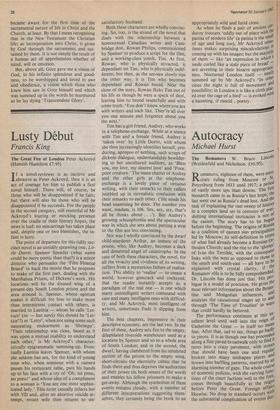Lusty Debut
Francis King
If a novel-reviewer is as incisive and abrasive as Peter Ackroyd, then it is an act of courage for him to publish a first novel himself. There will, of course, be those who will be disappointed if he fails; but there will also be those who will be disappointed if he succeeds. For the people in the second category, still resentful of Mr Ackroyd's louring or mocking presence over the cradle of their literary hopes, the news is bad: no miscarriage has taken place and, despite one or two blemishes, the in- fant is lusty.
The point of departure for this tidily suc- cinct novel is an untidily sprawling one, Lit- tle Dorrit. Spenser Spender (what name could be more poetic than that?) is a minor director who persuades the 'Film Finance Board' to back the movie that he proposes to make of the first part, dealing with the Marshalsea Prison, of Dickens's work. His locations will be the disused wing of a present-day South London prison and the area around it. Spenser, whose egotism makes it difficult for him to make more than intermittent contact with others, is married to Laetitia — whom he calls 'Let- tuce' (sic — but surely this should be 'Let- tke'?) or "Letty', when not using some such nauseating endearment as `Shrimpy'. `Their relationship was close, based as it was upon a mutual inability to understand each other,' is Mr Ackroyd's character- istically epigrammatic summing-up. Even- tually Laetitia leaves Spenser, with whom she seldom has sex, for the kind of young man who, when someone with a camera passes his restaurant table, puts his hands up to his face with a cry of 'Oh, no press, no press!' and whose idea of a compliment to a woman is 'You are one most sophist- icated lady.' This lover casually infects her with VD and, after an abortive suicide at- tempt, errant wife then returns to un-
satisfactory husband.
Both these characters are wholly convinc- ing. So, too, is the strand of the novel that deals with the relationship between a homosexual Canadian writer and Cam- bridge don, Rowan Philips, commissioned by Spenser to produce a script for the film, and a working-class youth, Tim. At first, Rowan, who is physically attracted, is dependant on Tim, who is physically indif- ferent; but then, as the see-saw slowly tips the other way, it is Tim who becomes dependant and Rowan bored. Near the close of the story, Rowan flicks Tim out of his life as though he were a speck of dust, leaving him to brood resentfully and with some truth: 'You don't know where you are with writers and such like. They're all over you one minute and forgotten about you the next.'
Tim has a girl-friend, Audrey, who works in a telephone-exchange. While at a seance with Tim and a female friend, Audrey is `taken over' by Little Dorrit, with whom she then increasingly identifies herself, pro- ducing, apropos of nothing, such scraps of dickens dialogue, understandably bewilder- ing to her uncultured auditors, as 'Bless you, my love, my dearest love' and 'Poor, poor creature.' The inane chatter of Audrey and the other girls at the telephone- exchange is a lovely piece of virtuoso writing, with their remarks to their callers jumbled up in surrealistic confusion with their remarks to each other. (`He needs his head examining he does. The number you want, madam, is 106. Sex, sex, sex, that's all he thinks about . . .'). But Audrey's growing schizophrenia and the spectacular way in which she sets about putting a stop to the film are less convincing.
Nor was I wholly convinced by the dwarf child-murderer Arthur, an inmate of the prison, who, like Audrey, becomes a dark and demented angel of catastrophe. In the case of both these characters, the novel, for all the vivacity and vividness of its writing, suffers from a mysterious failure of realisa- tion. This ability to 'realise' — to create a world, however gimcrack and cockeyed, that the reader instantly accepts as a paradigm of the real one — is one which many unintelligent writers command with ease and many intelligent ones with difficul- ty; and Mr Ackroyd; most intelligent of writers, sometimes finds it slipping from him.
The best chapters, impressive in their descripive economy, are the last two. In the first of these, Audrey sets fire to the empty, dilapidated riverside warehouses used as a location by Spenser and so to a whole area of South London; and in the second, the dwarf, having clambered from his inhabited section of the prison to the empty wing, short-circuits the electricity cables that he finds there and thus deprives the authorities of their power (in both senses of the word) and enables his fellow prisoners to make a get-away. Although the symbolism of these events remains cloudy, with a number of different interpretations suggesting them- selves, they certainly bring the book to an appropriately wild and lurid close.
As when he finds a pair of ancient Or' duroy trousers 'oddly out of place with the patina of modern life' (a patina is the result of age and long use), Mr Ackroyd some' times makes surprising miscalculations .111, coming up with his images; but the major0 of them — like 'an expression in which a smile curled like a stale piece of bread' are arresting in their bizarre approPriate,:, ness. Nocturnal London itself — neat': summed up by Mr Ackroyd's 'In other
.
cities the night is full of movement and possibility; in London it is like a cloth plac: ed over the cage of a bird' — is evoked with a haunting, if rancid , poetry.


































 Previous page
Previous page